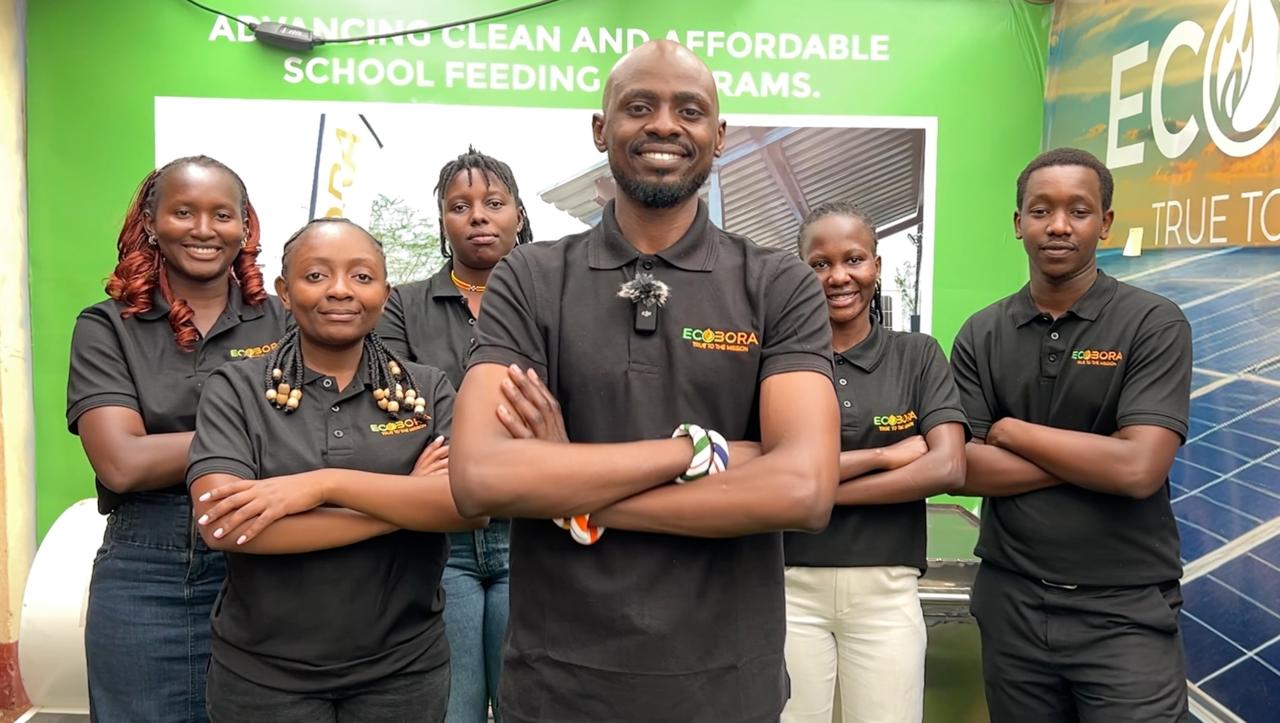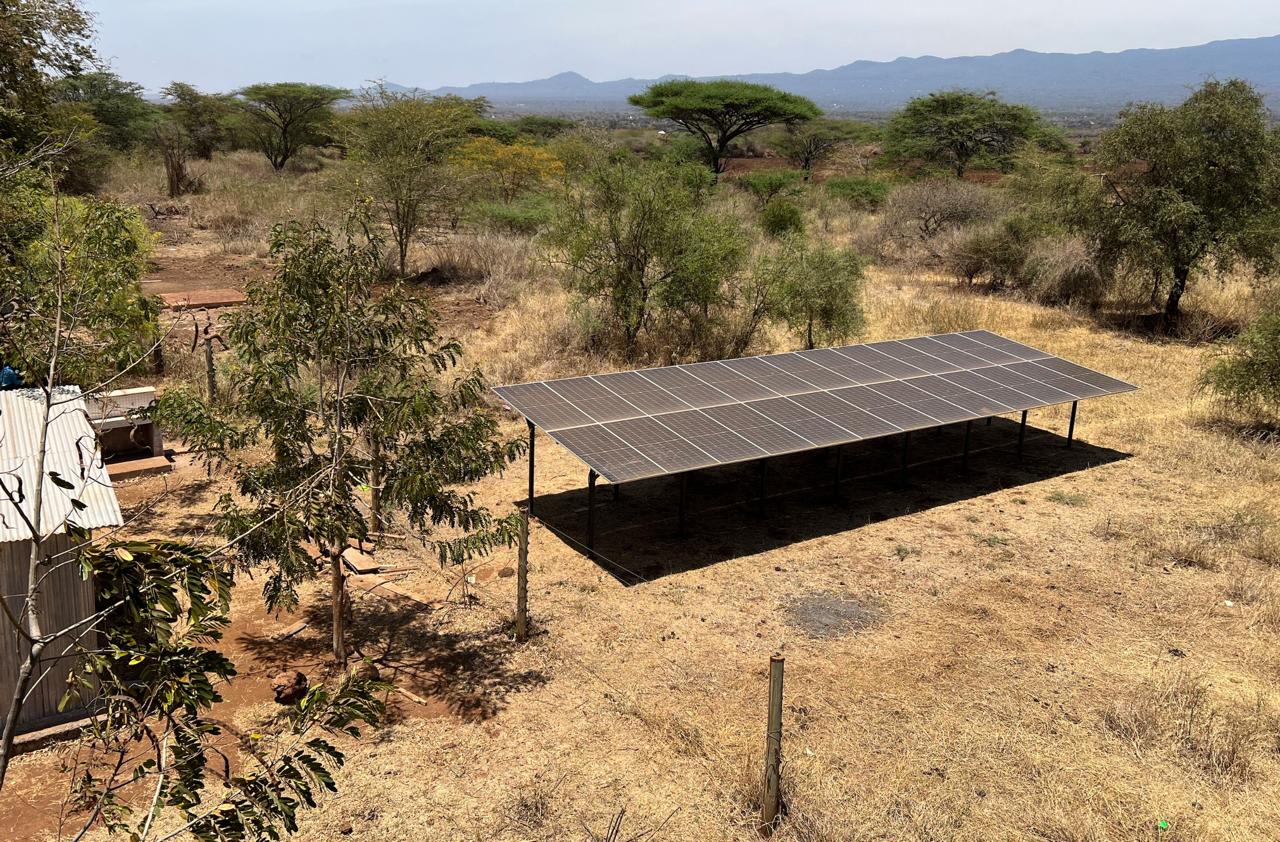
New solar battery aims to boost water access and power rural homes
Study finds high fuel costs had previously limited irrigation
What began as an act of charity has grown into a model for sustainable school energy.
In Summary

Audio By Vocalize
 Ecobora CEO Justine Abuga with his employees / VICTOR IMBOTO
Ecobora CEO Justine Abuga with his employees / VICTOR IMBOTOWhen Justine Abuga walked into a children’s home in Dandora Phase Five 13 years ago, he had no idea the visit would change his life—and the future of school kitchens in Kenya.
At the time, Abuga was part of a charity group that supplied foodstuffs and sanitary products to children’s homes around Nairobi. But that day, something was different.
“We were surprised to learn that these kids had never been fed for the past one week. Yet there was food in the store. The home could not cook because there was no firewood, and it was raining in Nairobi. The homeowner told us it’s very difficult to collect firewood in Nairobi, let alone when it’s raining,” he said.
That experience, which Abuga describes as “a light bulb moment,” made him question why his group could not be different from other charity organizations.
“We asked ourselves, why can’t we be different? Instead of bringing clothes and food, why can’t we bring and donate energy?”
That single question sparked what would become Ecobora, a Kenyan company now leading a solar-powered cooking revolution in schools.
After that encounter, Abuga began searching for cleaner cooking alternatives by researching online. He asked himself whether there was clean charcoal that did not emit smoke and was not dirty to carry around.
He soon stumbled upon pellets—compressed sawdust being used in Europe as a clean fuel.
Intrigued, he purchased the first batch and donated it to the same children’s home. But the home never used it.
“They told us the pellets required a special stove. We went back to the drawing board to find out which stove could use them,” he added.
Through months of trial and error, Abuga and his team developed their first pellet stoves and began donating them to children’s homes.
But soon, they realised the model was unsustainable. “We can’t keep on making the stoves, making the fuel, and donating the fuel. Someone has to pay for it, as a business,” he said.
That realisation marked the birth of Ecobora in 2015, headquartered in Westlands with a factory in Kajiado town.
When the government later imposed a logging ban, Abuga’s team could no longer access raw materials for their pellets.
For nine months, business came to a halt. That’s when he began rethinking the future of cooking.
After several rounds of research and development, Ecobora created Kenya’s first solar-powered cooking boiler for schools—a game changer in clean energy technology.
“We manufacture the stoves from scratch, install them, and train the users. We do everything across the value chain, from manufacturing, installations, training, and even repair and maintenance.”
Ecobora currently employs 14 permanent staff—half of them women—and 22 temporary workers, mostly Maasai youth and women based at the factory.
The company’s mission, Abuga said, is to uplift rural, marginalized schools out of energy poverty.
The solar panels capture the sun’s energy, which is converted into electrical energy.
The power goes through the inverter to the lithium batteries, which store it for cooking even at night or during rainy days.
The stored energy powers the solar stoves, which can cook all types of meals.
“We can boil, fry, steam, and even roast. Githeri is the best meal to cook. We do it in two hours, unlike firewood stoves that take four to six hours,” he said.
According to him, the stoves are durable, made from stainless steel food-grade material, and have a lifespan of 25 to 45 years.
Ecobora gives schools a three-year warranty on the stoves and 15 years for the solar panels and batteries.
Abuga said that schools spend between Sh1 million and Sh6 million per year on firewood.
“With our solution, it only costs between Sh2 million and Sh4 million to install the system. In two years, the school will have recovered its investment and stopped buying firewood."
According to him, the savings have been transformative, as he has witnessed schools use the funds to equip computer labs, build classrooms, and improve students’ diets.
Some schools that could not provide breakfast now serve porridge to pupils every morning.
Abuga said schools using Ecobora’s system also earn carbon credits because they reduce emissions.
The CEO said the journey hasn’t been easy, and he struggled to attract skilled workers.
“The first challenge was getting capital to start out. We didn’t have collateral, and no bank could give us money. For the best talent, we couldn’t afford them, and those we could afford didn’t have the skills,” he said.
Another major hurdle was convincing people that solar could cook.
“People thought githeri can only be cooked using firewood. It really took us a long time doing free demos to convince users that solar can cook.”
According to him, some schools and procurement officers were resistant because the switch to solar would disrupt existing firewood supply chains.
Despite the setbacks, he says, Ecobora’s impact is visible as schools are now using excess solar energy from the stoves to power computer labs and classrooms.
Teachers, too, have joined the green transition by buying electric stoves powered by the same solar systems to cook their meals.
“We can never, ever end poverty without ending energy poverty,” he said.
 Solar Panels at Olmapinu Comprehensive School / VICTOR IMBOTO
Solar Panels at Olmapinu Comprehensive School / VICTOR IMBOTOUnilever East Africa Managing Director Luck Ochieng commended Ecobora’s clean energy innovation, describing the partnership as a game-changer for schools and communities across Kenya.
“At Unilever, we partnered with Ecobora through the TRANSFORM initiative, a collaboration between Unilever, the UK’s Foreign, Commonwealth and Development Office (FCDO), and EY. Their solar-powered cooking technology is helping schools move away from firewood, improving health, and keeping more children in school,” he said.
Ochieng said Ecobora distinguished itself through its innovative pay-as-you-go solar boilers, which lower cooking costs and carbon emissions while directly supporting education.
He added that the technology has the transformative potential to improve nutrition, increase school attendance, and create healthier learning environments while also reducing deforestation and indoor air pollution.

Study finds high fuel costs had previously limited irrigation